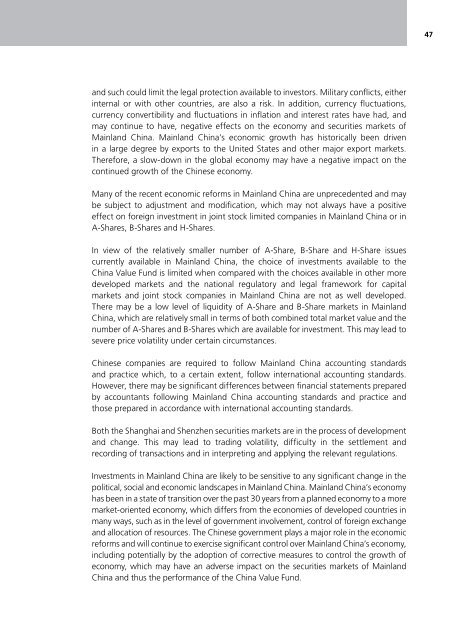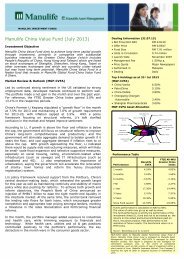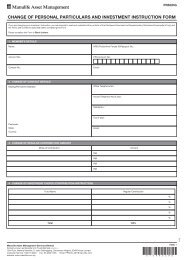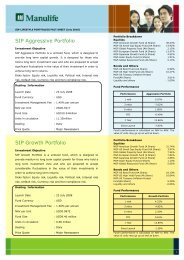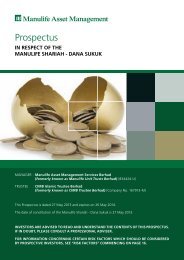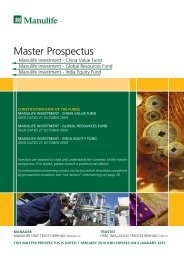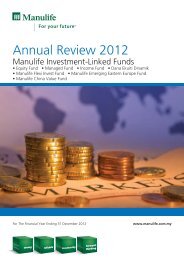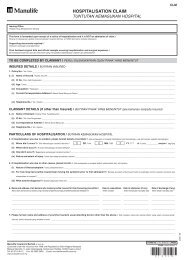trustworthy - Manulife Insurance Berhad
trustworthy - Manulife Insurance Berhad
trustworthy - Manulife Insurance Berhad
You also want an ePaper? Increase the reach of your titles
YUMPU automatically turns print PDFs into web optimized ePapers that Google loves.
47<br />
and such could limit the legal protection available to investors. Military conflicts, either<br />
internal or with other countries, are also a risk. In addition, currency fluctuations,<br />
currency convertibility and fluctuations in inflation and interest rates have had, and<br />
may continue to have, negative effects on the economy and securities markets of<br />
Mainland China. Mainland China’s economic growth has historically been driven<br />
in a large degree by exports to the United States and other major export markets.<br />
Therefore, a slow-down in the global economy may have a negative impact on the<br />
continued growth of the Chinese economy.<br />
<br />
Many of the recent economic reforms in Mainland China are unprecedented and may<br />
be subject to adjustment and modification, which may not always have a positive<br />
effect on foreign investment in joint stock limited companies in Mainland China or in<br />
A-Shares, B-Shares and H-Shares.<br />
In view of the relatively smaller number of A-Share, B-Share and H-Share issues<br />
currently available in Mainland China, the choice of investments available to the<br />
China Value Fund is limited when compared with the choices available in other more<br />
developed markets and the national regulatory and legal framework for capital<br />
markets and joint stock companies in Mainland China are not as well developed.<br />
There may be a low level of liquidity of A-Share and B-Share markets in Mainland<br />
China, which are relatively small in terms of both combined total market value and the<br />
number of A-Shares and B-Shares which are available for investment. This may lead to<br />
severe price volatility under certain circumstances.<br />
Chinese companies are required to follow Mainland China accounting standards<br />
and practice which, to a certain extent, follow international accounting standards.<br />
However, there may be significant differences between financial statements prepared<br />
by accountants following Mainland China accounting standards and practice and<br />
those prepared in accordance with international accounting standards.<br />
Both the Shanghai and Shenzhen securities markets are in the process of development<br />
and change. This may lead to trading volatility, difficulty in the settlement and<br />
recording of transactions and in interpreting and applying the relevant regulations.<br />
Investments in Mainland China are likely to be sensitive to any significant change in the<br />
political, social and economic landscapes in Mainland China. Mainland China’s economy<br />
has been in a state of transition over the past 30 years from a planned economy to a more<br />
market-oriented economy, which differs from the economies of developed countries in<br />
many ways, such as in the level of government involvement, control of foreign exchange<br />
and allocation of resources. The Chinese government plays a major role in the economic<br />
reforms and will continue to exercise significant control over Mainland China’s economy,<br />
including potentially by the adoption of corrective measures to control the growth of<br />
economy, which may have an adverse impact on the securities markets of Mainland<br />
China and thus the performance of the China Value Fund.


